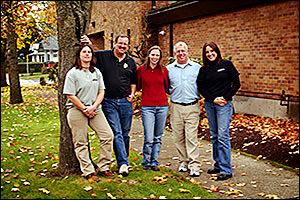Before joining the staff of Prison Fellowship in 2007, Patti Tasa was a vibrant volunteer—serving inside prison for three years, then another three years as county coordinator for one of Prison  Fellowship’s Aftercare Teams. Her long-standing mentoring relationship with ex-prisoner Tina Huber has given her valuable experience and insights to share with other mentors. Patti is also a gifted singer and songwriter, whose song “Light My Way” serves as the theme to a DVD that illustrates the need for churches to embrace and assist ex-prisoners.
Fellowship’s Aftercare Teams. Her long-standing mentoring relationship with ex-prisoner Tina Huber has given her valuable experience and insights to share with other mentors. Patti is also a gifted singer and songwriter, whose song “Light My Way” serves as the theme to a DVD that illustrates the need for churches to embrace and assist ex-prisoners.
Frontlines: Even though prisoners and ex-prisoners are adults, it seems that many of them lack the decision-making tools that most adults possess. Do you think this should affect the way a mentor approaches a mentoring relationship? If so, how?
Patti: Absolutely. I think there first needs to be an understanding of the struggle [prisoners] have making decisions when they come out of prison. They’ve been institutionalized—many for years—and the ability to make a decision has been taken away from them. So, when they come out of prison, even the simple task of ordering off a menu is overwhelming to them. As a mentor, it’s important to first have that knowledge that that is a struggle they have while you’re mentoring them and while they’re preparing for release. And once they’re released, just continuing to encourage them that there’s nothing wrong with them and that this is a very normal process.
Frontlines: What are some good questions a mentor should be regularly asking his or her mentoring partner?
Patti: I would ask them to give an overview of how their week went. If it’s an employment issue: “How are you doing in seeking employment? What are some of your struggles there?” . . . You need to think ahead of time [so] that you’re not just asking a shallow question and wanting a quick response, but you’re really trying to find the layers of what they’re saying to see how you can plug hope and encouragement into each layer.
Another [question] would be, “How are you doing attending support groups or recovery groups?”—if they have an addiction issue. “What’s that like? Have you had any triggers this week?” By triggers I mean, “Have you had situations that have caused you to want to use again?” And then allowing them to say, “Yeah, I did, actually” . . . Instead of discouraging them as a failure, just say, “You know, good for you that you didn’t.” And just again, in that situation, find ways to encourage them and to remind them that triggers are normal. And thank them for sharing and, “Hey, I’m going to be praying for that situation for you.”
If they’re having a desire to reconnect with their family, this could be another question: “How is your relationship with your children going?” If it’s a viable relationship and it’s okay through their parole conditions: “Have you been able to begin the healing process?” And, again, allow them to share some of their pain and frustration, or their joys, in that. And the mentor can remind the [ex-prisoner] that the process of healing and restoration with families—especially with children—takes time. And rejoice in the small steps, but don’t get discouraged in the setbacks. “God is a God of restoration, and just like He restored you, He’s going to restore your relationship with your family.” Again, it’s the positive feedback. It’s the message of hope. And always backing it up with God’s Word . . . mentors should be prepared to have Scriptures available that speak truth and hope and restoration and God’s promises of provision.
Frontlines: What is something that individuals might feel uncomfortable discussing with their mentors?
Patti: It just all depends on the type of relationship that they have. It depends if [the ex-prisoner] is a male or a female . . . they kind of relate differently, and respond differently to different issues in their life. I think for the women prisoners, some of the hardest things to talk about are their children, as far as past regrets. A lot of them have had their children removed, and they’ve been adopted out or they’re no longer in custody with them . . . I think it’s an area that needs a lot of encouragement and hope.
I think for men, probably the biggest area is if they’re dealing with a sexual offense and they have probably the biggest hurdle to go through as far as reentering society. And it takes a real special mentor that can really encourage them because everything around them is really rejecting them.
Frontlines: Let’s say there’s a hard issue you have to bring up with the person you are mentoring. How do you know when to keep pressing an issue and when to just let it go?
 Patti: One of the most common struggles newly released inmates have is their relationship with their parole officer. As mentors, we’re constantly needing to remind them that their POs are trying to help them. They’re not there to make their lives miserable. They are there to help them and protect the community.
Patti: One of the most common struggles newly released inmates have is their relationship with their parole officer. As mentors, we’re constantly needing to remind them that their POs are trying to help them. They’re not there to make their lives miserable. They are there to help them and protect the community.
One man who was newly released came through our ministry. He came to my office and he said, “I had a beer the other day.” An, I said, “You know, you need to call your PO.” He got really upset with me and he said, “I am going to end up going back to prison.” I said, “If you do the right thing, God’s Word says He will honor you, and He doesn’t go back on His Word. But if you hide this secret . . . you’re just going to end up going deeper and deeper into sin.” He agreed to call his PO right there in the office and left her a message and told her what had happened. He came back to my office the next day smiling ear to ear and said, “She called me back and she thanked me for being honest.”
What would have happened in that moment if I’d kind of ignored it? [That person] has never gone back to prison—he’s been out for seven years now. But the scenario would have been a lot different, I think, because one sin would have led to another. But God used that situation as a very teachable moment about being honest and open and trusting God for the outcome.
Frontlines: What are some healthy boundaries that a mentor should set up with his or her mentoring partner?
Patti: It’s all about establishing trust with your [mentoring partner]. Mentors aren’t to give [prisoners] their personal addresses or their home phone numbers . . . When they get out, they meet in a public place, like a coffee house. Until they’ve established a trusting relationship, we don’t encourage mentors to bring [ex-prisoners] to their houses. We have seen those relationships develop, and they’ve become really good friends, and [then] they invite each other to each other’s houses.
I think unhealthy boundaries would be if the mentor tries to do too much for the ex-prisoner, as far as always driving them to get their job applications, doing things for them that they really need to learn to do by themselves. However . . . it’s really important—especially in the first couple of weeks—to help the ex-prisoner acclimate back into society, and having that person there to drive them to appointments is really a wonderful thing to do. But the boundary comes in when you find yourself a few weeks down the road, getting calls three or four times a week. The danger there is that you’re not really allowing that person to take responsibility . . . you can become overly helpful.
Frontlines: Obviously, you’ve had a very positive mentoring relationship. What have been some of the highlights of that for you?
Patti: When I first met [my mentoring partner] and heard her story, it was humbling to me that she was in prison . . . In the past I may have judged somebody who was in prison . . . the Lord really allowed me to see the face of the prisoner and the heart of the prisoner through that relationship. And they are just like you and I. They just have the basic needs we all have to be loved and be cared for. Now she’s my friend.
Frontlines: What else is important for mentors to know?
Patti: You’ve got to be really sensitive to where they’re at spiritually . . . I think it’s really important—especially when someone’s beginning to mentor somebody—to really listen to them, listen to where they’re at spiritually, and not try to throw too much at them at once. To have those moments of struggles without throwing the book at them right away . . . Sometimes fewer words are better, and we don’t want to over-evangelize somebody when they’re not ready. It doesn’t do them any good, and I really don’t think that’s how Christ is either.